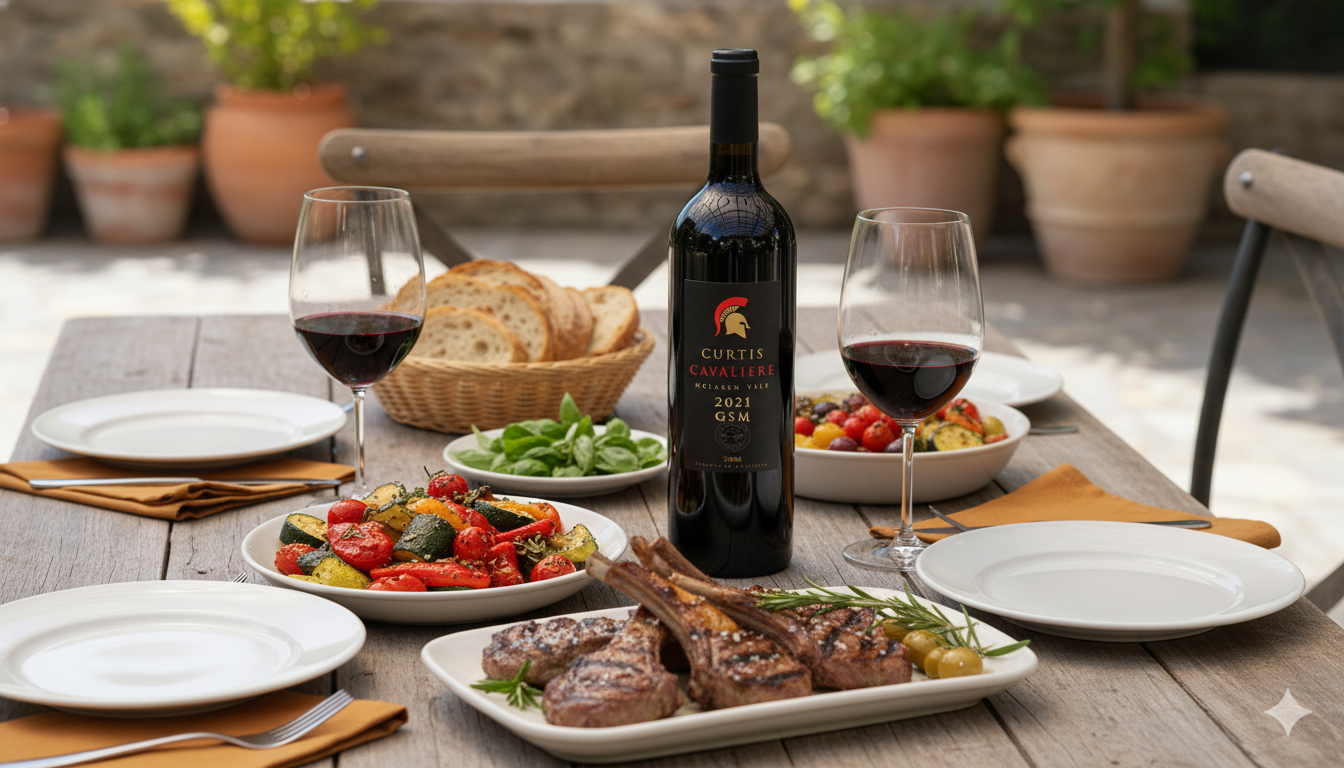Introduction - Mclaren Vale Grenache Wine
While Mclaren Vale Grenache might not grab headlines like Shiraz or Cabernet Sauvignon, this remarkable variety has quietly become one of McLaren Vale's most exciting success stories.
At Curtis Family Vineyards, we've witnessed firsthand how our Mediterranean climate and unique terroir transform Grenache into wines of exceptional quality and character.
The Perfect Climate Match for Mclaren Vale Grenache Wine
Grenache originated in Spain's warm, dry regions before spreading throughout the Mediterranean. McLaren Vale's climate provides ideal conditions:
Mediterranean Weather Pattern
- Warm, dry summers with minimal rainfall
- Cooling sea breezes from Gulf St. Vincent
- Long, stable ripening periods
- Protection from extreme weather events
This climate allows Grenache to ripen fully while maintaining the natural acidity that makes the variety so food-friendly and age-worthy.
Soil Diversity Creates Complexity
McLaren Vale's varied geology contributes significantly to Grenache quality:
Red Clay Over Limestone
Our Curtis Family vineyards grow on red clay soils over limestone bedrock, providing:
- Excellent water retention during dry periods
- Natural pH balance for optimal vine health
- Mineral complexity that translates to wine character
- Good drainage preventing waterlogged roots
Ancient Sand and Gravel
Other Grenache vineyards in the region benefit from:
- Fast-draining sandy soils
- Concentrated fruit flavors
- Earlier ripening characteristics
- Distinctive mineral undertones
Old Vine Advantage
Many of McLaren Vale's Grenache vines were planted in the 1940s-1960s, creating what winemakers call "old vine" character:
Benefits of Mature Vines:
- Naturally low yields producing concentrated fruit
- Deep root systems accessing water and nutrients
- Consistent year-to-year performance
- Complex flavor development
These established vines produce smaller crops of intensely flavored grapes, resulting in wines with remarkable depth and complexity.
Unique Flavour Profile
McLaren Vale Grenache displays distinctive characteristics:
Primary Flavours:
- Fresh red berries (raspberry, strawberry, cranberry)
- Sweet cherry and red plum notes
- Subtle floral undertones
Regional Characteristics:
- White pepper and spice complexity
- Hints of Mediterranean herbs
- Mineral earthiness from diverse soils
- Natural freshness from sea breezes
Texture and Structure:
- Silky, elegant mouthfeel
- Medium body with balanced alcohol
- Fine-grained tannins
- Crisp, food-friendly acidity
Winemaking Philosophy
Modern McLaren Vale Grenache production emphasizes:
Gentle Handling
- Hand-harvesting to preserve delicate fruit character
- Careful sorting to remove any inferior berries
- Gentle crushing to avoid harsh tannin extraction
- Temperature-controlled fermentation
Traditional Techniques
- Wild yeast fermentation for complexity
- Extended skin contact for color and flavor
- Minimal intervention philosophy
- Careful blending decisions
Food Pairing Versatility
McLaren Vale Grenache's balanced structure makes it incredibly food-friendly:
Excellent Pairings:
- Grilled salmon or tuna
- Herb-crusted lamb
- Mediterranean vegetable dishes
- Aged goat cheese
- Charcuterie and terrines
Why It Works: The wine's natural acidity and moderate tannins complement rather than overpower food flavors, making it perfect for diverse cuisines.
Aging Potential
Quality McLaren Vale Grenache can age beautifully:
Short-term (2-5 years):
- Bright fruit flavors at their peak
- Fresh, vibrant character
- Optimal food pairing versatility
Medium-term (5-10 years):
- Developed complexity
- Integrated tannins
- Secondary flavor development
Long-term (10+ years):
- Tertiary characteristics emerge
- Silky, elegant texture
- Complex, evolved flavours
Comparison to Other Regions
McLaren Vale Grenache differs from other renowned regions:
vs. Barossa Valley:
- More elegant and food-friendly
- Higher natural acidity
- Less alcohol and more finesse
vs. French Grenache:
- Riper fruit character
- More approachable in youth
- Distinctly Australian personality
vs. Spanish Garnacha:
- Greater consistency year to year
- More refined tannin structure
- Unique maritime influence
The Curtis Family Approach
Our winemaking philosophy emphasizes Grenache's natural elegance:
- Sustainable vineyard practices
- Selective handpicking at optimal ripeness
- Minimal intervention winemaking
- Careful oak management to preserve fruit character
Investment in Quality
McLaren Vale producers continue investing in Grenache:
- Replanting with premium clones
- Improving vineyard management techniques
- Experimenting with innovative winemaking
- Building international recognition
Future Prospects
McLaren Vale Grenache is experiencing renewed interest:
- Growing international recognition
- Increasing domestic appreciation
- Rising quality standards
- Expanding plantings of premium sites
The Signature Profile of McLaren Vale Grenache

McLaren Vale Grenache has become one of Australia’s most expressive and exciting reds — known for its balance of bright fruit, fine texture, and effortless drinkability. It’s the wine that bridges old-world charm and new-world vibrancy.
Core Aromatics & Texture
When you swirl a glass of McLaren Vale Grenache, you’ll often find:
- Red cherry & raspberry – juicy and lifted, the heart of the flavor.
- Blood orange & rosehip – giving a tangy, floral freshness.
- White pepper & spice – a subtle, elegant lift on the finish.
- Texture: silky with powdery tannins and vibrant acidity, making it both bright and refined.
Typical lab data:
- ABV: 13.5–14.5%
- pH: 3.4–3.6
- TA (Total Acidity): 5.5–6.5 g/L
How McLaren Vale Grenache Differs
While Grenache grapes are grown worldwide, McLaren Vale gives them a distinct voice — shaped by Mediterranean sunshine, cooling sea breezes, and sandy soils.
|
Feature |
McLaren Vale Grenache |
GSM Blend (Grenache–Shiraz–Mourvèdre) |
Rhône Grenache (France) |
|
Fruit Profile |
Red cherry, raspberry, blood orange |
Darker fruit, plum, spice |
Strawberry, garrigue herbs |
|
Body & Texture |
Medium-bodied, silky, fine tannins |
Fuller-bodied, firmer tannins |
Lighter, rustic texture |
|
Acidity |
Fresh and vibrant |
Moderate |
Soft, rounded |
|
Style |
Pure, expressive, elegant |
Structured and bold |
Earthy and savoury |
In short: McLaren Vale Grenache is where bright fruit meets finesse — a wine that’s as approachable as it is complex, and perfect for everything from casual meals to serious tastings.
What to Eat With It McLaren Vale Grenache Wine

McLaren Vale Grenache is a food lover’s dream. With its bright red fruit, gentle spice, and smooth tannins, it pairs beautifully with dishes that bring warmth, herbs, and a touch of char. Whether it’s a casual dinner or something special, this wine adapts with ease.
Why It Works
Grenache’s vibrant acidity cuts through rich or fatty foods, while its silky texture and spice notes echo grilled, smoky, and herby flavours. Think of it as the middle ground between a light Pinot Noir and a bold Shiraz — flexible and food-friendly.
Top Pairings
- Wood-roasted lamb – the meat’s richness balances Grenache’s acidity.
- Chargrilled octopus – smoky edges match the wine’s white pepper notes.
- Tomato-herb pasta – acidity meets acidity for perfect harmony.
- Charcuterie & cured meats – saltiness brings out the fruit.
- Middle Eastern spices (sumac, cumin, pomegranate) – spice meets spice.
- Hard cheeses (Manchego, aged cheddar) – their nutty flavour pairs with Grenache’s soft tannins.
Quick Pairing Matrix
|
Grenache Style |
Best Food Matches |
Why It Works |
|
Fresh / Early-Release |
Tomato pasta, grilled seafood, charcuterie |
Bright acidity and lighter body balance freshness and salt. |
|
Old-Vine / Single-Vineyard |
Roast lamb, slow-cooked meats, hard cheeses |
Deeper fruit and structure stand up to rich, savoury dishes. |
In short: McLaren Vale Grenache is the ultimate dinner companion — lively enough for seafood and pasta, yet rich enough for roasted lamb and spice-driven dishes. It’s a wine that truly sings with food.
Conclusion
At Curtis Family Vineyards, we're proud to be part of McLaren Vale's Grenache renaissance. Our commitment to showcasing this variety's unique regional character continues with each vintage, creating wines that truly express the special terroir of our Mediterranean-climate region.
Experience McLaren Vale Grenache excellence with Curtis Family Vineyards' small batch wine series carefully crafted selections, showcasing four decades of regional winemaking expertise.
Curtis Small Batch McLaren Vale Grenache
Curtis Limited Series McLaren Vale Grenache
Frequently Asked Questions
Is Grenache a light or heavy wine?
Grenache is typically a medium-bodied red wine with soft tannins and vibrant fruit flavours. While not as heavy as Shiraz or Cabernet, Grenache offers a lovely balance between lightness and richness, making it a popular choice among Australian wine lovers.
Is Grenache wine dry or sweet?
Grenache is generally a dry red wine, though its ripe fruit profile—think raspberry, cherry, and spice—can give the impression of sweetness. Some Australian winemakers may produce slightly off-dry or sweet styles, especially in blends or rosés.
What wine is Grenache similar to?
Grenache is often compared to Pinot Noir wine or Zinfandel, thanks to its fruity nature and smooth texture. In Australia, it’s also commonly blended with Shiraz and Mourvèdre (GSM), creating a flavourful red wine that’s rich, approachable, and food-friendly.
Is Grenache wine medium or full-bodied?
Grenache is usually considered a medium-bodied wine, though warmer climates like McLaren Vale can give it a fuller feel with richer fruit intensity and slightly higher alcohol content. It's perfect for those who enjoy bold yet balanced reds.
Is Grenache stronger than Shiraz?
Shiraz is typically stronger than Grenache in terms of body, tannins, and alcohol. However, Grenache from regions like McLaren Vale can still pack a punch with bold fruit, spice, and warmth, making it a deliciously expressive red wine in its own right.



Leave a comment
This site is protected by hCaptcha and the hCaptcha Privacy Policy and Terms of Service apply.